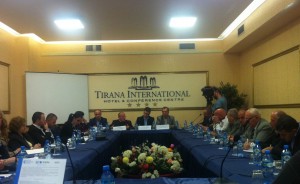The adoption and implementation of EU requirements for BIO Products, Conventional Products and Integrated Products

European Movement in Albania (EMA) in partnership with Slovak Foreign Policy Association, with the support of the Ministry of Agriculture, Rural Development and Water Resources organized on November 2, 2015 the third session of Working Group III:”The adoption and implementation of EU requirements for BIO Products, Conventional Products and Integrated Products ”
Mr. Gledis Gjipali, Executive Director of European Movement in Albania explained that the Working Groups are build to bring together important actors as civil society organizations, media, academia, and business with policy makers and other representatives from public sector. According to Mr. Gjipali, transparency during the EU integration process is important, with civil society and other interest groups being a support segment even in the opening the negotiations. This path is difficult and intensive, especially in the framework of approximation of EU law, drafting and its implementation in Albania.
Mr. Agim Rrapaj, Head of Albanian Agribusiness Council during his speech emphasized mainly the problematic issues regarding BIO, conventional and integrated products. Mr. Rrapaj said that 350 thousand Albanian families that produce BIO products face several difficulties i.e. high chemical fertilizers prices, ineffective insecticides and pesticides, lack of irrigation infrastructure, difficulties and costs in packaging and certification processes. According to the Head of AAC it is impossible for Albanian agriculture to compete European or regional market because the level of national agriculture production is 10 times lower in comparison with neighbouring countries. According to Mr. Rrapaj it would be necessary to introduce a new perspective which stimulates the production of organic products and lowers the prices. Mr. Rrapaj assessed free labour forces and uncontaminated soil as positive elements which could help the export of Albanian products into European markets.
Mr. Sali Metani, representative of Ministry of Agriculture, Rural Development and Water Management stressed out the need of a closer cooperation between state institutions and other actors. Knowing that 60 % of legislation drafted by European Commission is focused on agriculture, Mr. Metani spoke about the importance that this sector should have. He also emphasized the need of a wide information sharing and awareness raising among farmers regarding Albanian and European legislation. The dynamic cooperation between NGOs, private institutions and technical Directorates is also worthy because there is a lack of technical discipline. Also for a better cooperation between AAC and other bodies, Mr. Metani indicated as a solution the establishment of an electronic database platform where the EU required criteria would be listed.
The Working Group Expert Mr. Xhafaj, tackled the topic by analysing three main aspects: 1. policies 2. legal and 3. Institutional. According to Mr. Xhafaj, nevertheless the several positive policies undertaken regarding agriculture sector, as reflected in the strategic document about organic products there is a lack of statistics. The latest statistics are those of 2012 which can not reflect a clear view of actual situation and its potential, making the policies drafting difficult. Another problem is the low economic support, deriving as the government’s shortcomings in building structures that would help in the management of program and drafting policies as well as with other specific measures. On the other hand, the EU unlike Albania offers specific funds based in six priorities which can also be part of Albanian policies: 1.the direct payment for a single farm 2.fishery and aquaculture 3. research and innovation 4. organic farms schemes 5. schemes on setting up organic production foundations 6. schemes of organic production. Regarding the legal point of view, the certification of the organic products and the protection of products in domestic market remains a challenge for Albanian manufacturers. Mr. Xhafaj highlighted the lack of experts and responsible staff for bio products, conventional and integrated ones. The main duties according Mr. Xhafaj are monitoring the market, protection of BIO products and increasing capacity for policy making and implementation.
The meeting was followed by discussions and debates between experts of the working group, representatives of civil society and state authorities.





